#flutes-domain
Text
In addition to being stuck on My Time at Sandrock these past few weeks, I've also been distracted by what basically amounts to "blorbo from my head". I was trying out something to see if it would possibly work as a way to run some 5e Waterdeep modules solo so I could pretend to have some post-epilogue adventures with Ari and Gale (long story short: no, it doesn't work well for that, the search continues!).
Despite it not working out for my intended purpose, I did get a little pulled into the story that wound up emerging, and got very attached to the randomized character I was playing.

This is Eliana (or rather, the best representation I could make of her in BG3). She is a level 3, half-elf bard. She has a whole whopping 7 AC, and her spell list consists of such combat bangers like "disguise self", "minor illusion", "faerie fire", and "charm person".
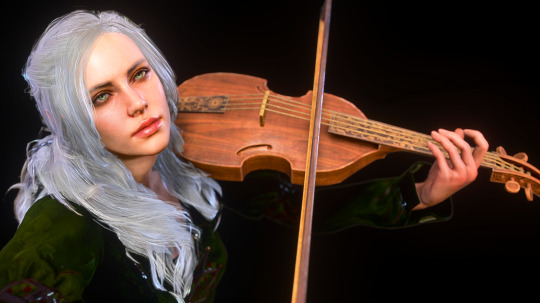

The other three party members are all rangers.
She has a -1 to her intelligence, but consistently rolls a 5 or lower on almost every INT based check (which seems to be about half of the checks she has to make). She introduced herself to her future boyfriend by continually pretending he and one of the other rangers were having an illicit moonlight affair.
Her charm person spell failed once during an encounter on an enemy and she rolled a Nat20 on deception to still convince him to hand over a box containing a potentially world ending McGuffin during combat. She has a rapier but didn't draw her weapon and do damage until like 75% of the way in. She talks to trees, not because it's an inherent ability or she's really into nature, but because it just seems polite at the time. (Sometimes they even talk back... sort of.)
She's befriended a random dire wolf and was nearly murdered by a cute little tabby cat. She disguised herself as the BBEG to interrogate a bunch of cultists who were trying to capture her. She has somehow managed to weaponize the Light cantrip.
Her mortal enemy is a door.

seen here, plotting said door's demise
She is utterly ridiculous and I love her.
So, of course I had to bring this powerhouse into BG3 for an honor mode run.
She did surprisingly well for the tutorial, but then she and Shadowheart forgot to have weapons equipped when walking into the first post-prologue fight and I got a very rude awakening when facing off against the Intellect Devourers. Poor SH died while Eliana ran like the dickens. I tried to alt-f4 to start the encounter over but the game was like "haha nice try" and saved as it was shutting down. After leaving poor SH to her doom, she went and found Gale and Astarion, remembered to equip a weapon, and got vengeance on the little pesky brains and revive my poor suffering cleric girl (who will soon be respecced into a poor suffering ranger girl once we find Withers, as well as the rest of the team).
I'm almost tempted to take bets on how soon this honor mode run is going to end. There is no way they're getting to Act 3 with that enabled. Probably not past the Grove even.
#i love her *clenches fist* so much#she is SUCH a d&d bard#so ridiculous#like i thought the spell list i chose would somehow be disastrous#but it somehow just made for very amusing and creative takes on encounters#she actually has (or had rather) a lute originally#but since ari has domain over bg3 lutes#i gave her a violin instead#she'll probably switch over to a flute once i find one in-game#(she has not managed to top ari's circus shenanigans... but i don't think anything will take that crown)#honor mode supermodels
13 notes
·
View notes
Text

Sparkling
What do you think about my pic?
#Domaine Carneros#1240 Duhig Road#USA#Napa#Napa Valley#sparkling wine#wine tasting#don't drink and drive#travel#original photography#vacation#tourist attraction#landmark#close up#flute#wine glass#photo of the day#What do you think about my pic?#I'll be back this summer#California#West Coast
1 note
·
View note
Text

and patience, and pining
in which alex is determined to flirt so hard that henry can no longer resist him. a modern au. based on the prompt: surprise kiss/impulsive kiss. ~1.8k.
Between the two of them, Alex has always thought he’d be the one to cave first.
They’ve both arrived at the same time. Henry looks stupid-good in his well-fitted tuxedo. His hair is just over-styled enough that Alex wants to mess it up, and badly.
How one man can be so like this is frankly upsetting. No, scratch that; it’s illegal, is what it is. Criminal law is not Alex’s domain, but he’s pretty sure being this tempting in public is a certifiable offense.
“Alex,” says Henry, and he blinks, at least some sense returning to him.
“Right,” he says. “Shall we?”
Henry gives him a look like he’d rather be anywhere else on the planet, which, the reception is not even open bar, so Alex can’t say he disagrees.
“After you, Your Majesty,” he says, stepping from the door with a flourish, then, “I saw that.”
“Saw what?” asks Henry, already shouldering past him with his chin turned up.
“If I had a dollar for every time you rolled your eyes at me—”
“Good taste still can’t be bought, Alex.”
“That’s ironic,” Alex shoots back, smiling and nodding at one of the guests as they enter. “Considering my tie is way better than yours.”
Henry lifts his hand at another in greeting, and even his wave looks fucking majestic, the asshole. “I trust you’ll be at least somewhat behaved this evening?”
“You sure that’s what you want, sweetheart?”
Henry’s expression turns very dour, and Alex wonders, not for the first time, why that particular look on him makes Alex so crazy. The more severe Henry gets, the wilder Alex’s impulse to kiss him, and the urge to just give in.
Alex licks his lips.
Henry takes a cautionary step back. “Let’s do try to make it through the rest of the night without much carnage, yes?”
“I don’t know,” Alex muses. “When you threaten me with a good time like that…”
Henry mutters something under his breath and Alex can’t help but grin. Maybe the night holds some promise after all.
.
He decides he’s going to have to walk that back after a while.
The music is decent, and he was wrong about the open bar, thank God, but he’s barely seen Henry since some crusty-looking Wall Street types whisked him and Pez away to talk business, and Alex is bored.
He wants to dance. He wants to dance—with Henry. And because that’s not going to happen, Alex wants to do the next best thing, which is to dance while Henry pretends not to watch, but he’s not even facing the dance floor right now so there would be no fucking point. He’ll have to think of something else. Hmmm.
Nora shimmies up to him then with two new flutes of champagne. Bless. “Still pining?” she asks.
Alex whips around to glare at her, wounded. “What? Nora, no,” he says. Is it that obvious? Fuck.
Nora shrugs. “You do the thing where you look him when you think he won’t notice. Both of you. You guys kind of have it down to a science.”
Alex brightens immediately. “You’ve seen him looking at me?”
Nora sips her champagne. “Right now, for example.”
Henry looks quickly away when Alex glances over, which is as good an invitation as any in his book. One of the suits is talking at Henry, who seems about as engaged as a teapot right now. Pez has dialed up the charisma, distracting them easily from Henry’s silence. But to Alex, Henry looks downright miserable in comparison.
Well, Alex is here to do something about that.
He plucks the second flute from Nora’s hand. “You’re the best. Gotta go.”
She raises an eyebrow. “I thought you weren’t pining?”
“For that guy?” Alex gazes at Henry again, then says, quite honestly, “Always.”
.
It takes exactly two minutes for the Wall Street guys to politely excuse themselves. Alex watches them practically dissolve their way into the crowd, like a creepy bunch of Mr. Smiths from The Matrix, and he suppresses a shudder.
The look on Henry’s face is an appealing combination of annoyed and relieved. “Let me guess,” Alex deadpans, “you’re so grateful you could just kiss me right now.”
Henry’s expression turns distinctly disapproving as Pez chimes in, “Be patient and Hazza might even learn to admit it someday.”
“That’s what I’m hoping.” Alex grins sideways at Henry, who’s flushing the loveliest pink despite also frowning. “You’re welcome for rescuing you from the most tedious conversation known to man, by the way.”
“Actually, darling dearest,” Pez says lightly, “we were speaking with potential investors in the foundation.”
Oh. Shit. “Do you want me to charm them back over?” Alex wants to know, jerking a thumb in the direction they’d gone. “It is well within my power.”
“Not necessary.” Henry pulls a face. “I would’ve felt dirty about taking their money.”
“I would’ve felt wonderfully about it,” says Pez. “But now that you’ve freed up my dance card…” He cranes his neck around.
“Nora’s over there,” Alex says helpfully.
“Brilliant.” Pez’s eyes are the definition of sparkling. “Ah, and I see your sister’s about to join her. If you boys will excuse me—”
He helps himself to the rest of Alex’s champagne before sashaying off.
The two of them remain standing there a careful few feet apart, not looking at each other. Not that it matters; Alex is so hyperaware of him that he could reach over without even looking and take Henry’s hand if he wanted to. He won’t, but he wants to.
Knowing that he can is enough for now.
Henry looks askance at him after a moment. “You’re making this very hard, you know.”
Alex somehow manages not to smile at that. “Am I?”
Henry’s face screws up in faux concentration. “Let’s see. You’ve been a merciless flirt, even more so than usual. You wore the tie I bought you, which means you don’t hate it—”
“What? I love it,” interrupts Alex, just to be clear.
“—and you just drove off a very lucrative, albeit morally questionable, investment opportunity.” Henry’s also holding back a smile. “I don’t know how I’m supposed to not kiss you for that alone.”
“You still could,” Alex points out.
“And lose your silly bet?” Henry straightens, adjusting his cufflinks, and that might be the single hottest thing Alex has ever seen. “I think not. We both know you’ll be the first to give in.”
It’s true, Alex thinks; he’s pretty irresistible, but Henry is also far more controlled. Still, there’s a certain satisfaction in knowing that Alex gets to be the one who stretches him to his very limit. The level of restraint it takes Henry to resist him is a pretty big turn-on, if he’s being honest. Even when Henry wins, it will be no great loss on Alex’s part.
“Considering what’s at stake here,” Alex says lowly, leaning in just enough to catch the way Henry’s eyes darken, “I think I win either way.”
Henry does smile then, soft and warm and way too tempting not to kiss, though Alex perseveres. “I think we both do, darling.”
“That we can agree on,” says Alex. “So, do you want to…not…dance with me?”
“I thought you’d never ask.”
.
He slips up, once.
It’s in a goddamn photo booth of all things, and Alex would feel like such a cliché if he weren’t so busy feeling annoyed at the fact that he can’t hold Henry’s hand or kiss him in front of the camera. Instead, he lets Nora and June wedge in between them, grinning gamely when they take turns kissing Henry on the cheek.
At the literal last second before the flash is going off, Alex feels Henry take his hand from behind, lace their fingers ever so gently together, and squeeze.
In the photo that prints out, June and Nora are doubled over in laughter, eyes closed, unaware. Henry has his chin tipped up, his face doing some smoldery thing at the camera, and Alex is turned, simply gazing at him.
He takes it before anyone sees, tucking it safely into his wallet because bet or no bet, some things really are too sacred to share.
When he shows it to Henry later, Henry gets the same lovestruck look on his face as Alex does in the photo, and that’s all he needs.
.
It’s the cake that finally does it.
Pez, Nora and June are all crowded around the same piece, and it makes Alex sigh a little wistfully to think about how much better it would taste if he were sharing his with Henry.
He can’t help it. He peers at Henry’s own slice, squinting. “What flavor is that one?”
“Strawberry,” says Henry. There’s a crumb on his lip, and Alex doesn’t mean to fixate on it, but he’s now gone hours without kissing his boyfriend and he’s kind of mad about it even though it’s also kind of his fault. “Do you want a bite?”
Oh. Yeah, that’ll work. Alex can feel the others’ eyes on them as he leans closer, fully expecting that Henry will yield to his instincts and feed him a piece off his fork. It’s not a kiss, but it could definitely qualify as losing the bet. And then once Alex has won, he can not only kiss Henry as much as he likes, he gets to take Henry home with him and—well.
He frowns when Henry only holds the plate out. “Here, have some,” says Henry, gaze lifting to his, then just a bit lower. “Oh. Hang on, you’ve got a—”
In a move that’s beyond Alex’s wildest dreams, Henry cups his jaw and kisses the side of his mouth, with just the slightest bit of tongue.
Alex grins as Henry freezes against him, realizing his mistake too late. “Thanks, baby.”
“Bollocks,” says Henry. He pulls back and sighs, licking the rest of the buttercream from his lips. “I’ve lost, haven’t I.” Then, accusingly, “You did that on purpose, didn’t you.”
“I’d say I don’t kiss and tell, but.” Alex puts his hands on Henry’s thighs, using that grip to scoot their chairs closer together. “I am gonna kiss you now, so.”
“You’ll be getting to do a lot more than that,” Henry points out.
“Ew, did not need to hear that part,” June groans at the same time that Pez puts down their cake and says, “Please, I need to hear more.”
“There’s a legally binding document and everything,” says Alex, to Henry’s chagrin and Pez’s delight. “Drafted it up myself.”
“You two were pining that hard and you were already together?” Nora wants to know. “Actually, that tracks. Carry on.”
Henry has gone as pink as the cake now, but he’s smiling when Alex swipes up some more buttercream, touching it to Henry’s mouth before leaning the rest of the way in.
#rwrb#red white and royal blue#rwrbsource#rwrb fic#firstprince#firstprince fic#rwrb fanfic#firstprince fanfic#usernuria#iuserzoe#userveronika#chrissiewatts#usersteen#(also if anyone does or does not want to be tagged pls lmk!)
345 notes
·
View notes
Text
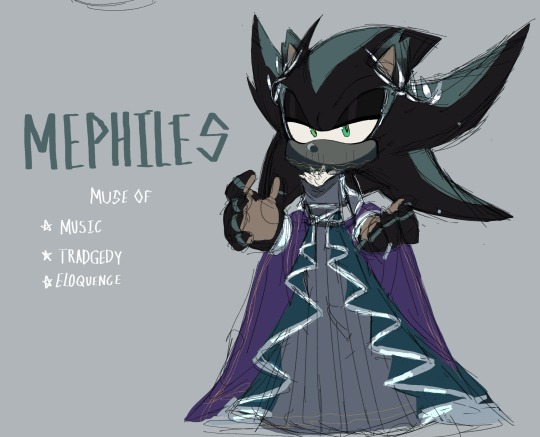
Diamond castle au- Mephiles as Lydia! The muse of Music, Tragedy and Eloquence
He’s a god, born on Olympus, chosen to be Apollos first muse, due to his prolific musical talents and understanding of tragic stories. Mephiles graciously accepted his position as well as his twin flutes
To him, to be a muse is to be the example, the authority, to have the final say over what people can and can’t do with their art, down to the style and expression.
Mortals were simple creatures, with fickle emotions that easily led them astray. They needed guidance, direction, the ability to create was gifted onto them and they needed to use that gift properly. (More accurately how he deemed it being used properly)
He was content in his care for the diamond castle and the way he ran things… but then Apollo chose another muse. A demigod. A descendant of an underworld god, gifted with full godhood in order to carry out his duties.
Mephiles wasn’t… fond of this decision, working with a mortal isn’t something he had ever foreseen and he didn’t think that this mortal would be capable of taking on these responsibilities. But he chose not to argue with the authority of lord Apollo and welcome the godling into his ranks as a fellow muse. He could be taught the proper ways after-all and, even when he was a mortal, the blood of a god still ran through his viens, this was about a century before Apollo introduces them to another chosen muse.
This one a pure mortal, not even a lick of godly blood in him and yet he was chosen.
Mephiles was completely baffled and infuriated by this decision but held his tongue, something that was hard to do when this… former-mortal was the most ungrateful one he’d ever seen, having as much snark as he had audacity as he clearly did not wish for this decision either
Everything Mephiles told him to do, he did the exact opposite! And if that wasn’t enough! He slacked in his duties! The mortals engaging in his art just did whatever they wanted and interpreted his aspects however they wanted and he just let them! In fact he actively encouraged it! Going down to the mortal realm, in mortal disguise to interact with them. And then, for some ungodly reason, the second muse (who had previously been butting heads with this new muse as well) followed his example!!! It was infuriating, especially when the two started to creating music, and doing whatever the heck they wanted with it! Starting to insist that he could lighten up cuz he didn’t actually have the authority on what people created
The final straw was when the two of them created music that in turn created a little godling (literally, they made a song an poof! Baby!) and the god Apollo proposed that the child train to be a muse
Mephilis wouldn’t stand for this anymore, they didn’t deserve to hold their positions so if they didn’t do things his then he’d take care of all the arts himself! But he knew he couldn’t exactly do anything, his fellow muses, though tainted by their former mortality, were just as powerful as he was. So he ventured down to Tartarus for something give an edge, he found the dark power he was looking for, as well as the dragon, iblis.
So he conspired to take over while tensions rose with the other two muses, what he needed was the instruments to have full control but for people to believe his authority he had to let those two ruin their own image to make him look better by comparison and ruining their harmony to make them more susceptible to his powers
But then Silver found out, told the other muses about him wanting to take over and they hid the castle and their instruments. The two muses tried to confront him and stop him but he quickly put a stop to that, they won’t be doing anything without his say so anytime soon… but the little apprentice got away, seemingly disappearing into thin air. Meph had a hunch that he knew the whereabouts but there was no sign of
His powers still only extended over his domain, so he still needed those instruments… but no matter, he was in charge and he was immortal, he had millennia to wait and there were only so many places that child could hide
#dear god this took so long to type out#gonna draw his other form at some point but im gonna focus on the other muses now#sonic au#sonic fanart#sonic fandom#sonic the hedgehog#sonic the hedghog fanart#sth au#sonic the hedgehog au#sonic#sonic art#sth#sth fanart#sth fandom#sonic au art#diamond castle au#mephiles the dark#mephiles sonic#mephiles fanart#mephiles the hedgehog
348 notes
·
View notes
Text
The Nine Muses
This is a very simple post about the Muses in hopes of explaining who they are, what their domains are, and some things they may be able to help with. This post isn't a deep dive by any means - just a simple introduction. Enjoy!
Who are the Muses?
The Muses, or Mousai, are goddesses of inspiration for various creative, scientific, and poetic endeavors. They were believed to also have knowledge of all things that have come to pass, remembering events with clarity that mortals could not hope to have. Their names are Kalliope, Kleio, Ourania, Thaleia, Melpomene, Polymnia, Erato, Euterpe, and Terpsikhore.
In total, there are nine Muses. The god Apollon was often believed to be the leader of the Muses, having a very close connection with them. The goddess Artemis was also paired with them.
Their origin and family varied depending on the source, but the most common notion was that Zeus and Mnemosyne are their parents and that they were born at the foot of Mount Olympus. Some other possible parents are Ouranos and Gaia, Zeus and Plousia, Pieros and Antiope, or even Apollon.
Poets of the past used to invoke the names of the Muses in hopes of gaining inspiration and the ability to gracefully convey their words. When a connection was drawn between them and Apollo, they were also known for their prophetic abilities as well, even being said to teach the art of prophecy.
What are each of their domains?
Kalliope - The eldest of the Muses, she is the goddess of eloquence and epic poetry. She is often considered the mother of Orpheus. She was depicted with a tablet, a scroll, or (later on) a lyre. Her name has been translated to mean "beautiful-voiced".
Kleio - Wise and intelligent, she is named the goddess of history. In art, she was often depicted with an open scroll or chest full of books. Her name was translated as "to make famous".
Ourania - Associated with the stars, she is the goddess of astronomy and astronomical writings. She has been depicted pointing at a celestial globe with a rod, but I wasn't able to find more information on her symbols. Her name means "heavenly one".
Thaleia - A goddess that helps bring joy to the world, she is the goddess of comedy and bucolic poetry. She was also considered to be the mother of the Korybantes (a group of seven demigods). She was often depicted with a comedy mask, a shepherd's staff, or a wreath of ivy. Her name has been translated as "festivity" or "blooming".
Melpomene - Holding a domain more somber than the Muse above, she is the goddess of tragedy. She was named the mother of the Sirens by Apollodorus. She was depicted with a tragedy mask, a sword, a wreath of ivy, or cothurnus boots. Her name likely means "to celebrate with song (and dance)".
Polymnia - With a name meaning "many hymns" or "many praises", it's no surprise that she's the goddess of religious hymns. She was often portrayed in a meditative pose.
Erato - A Muse that needs no introduction, she is the goddess of erotic poetry and mime. She was often portrayed with a lyre. Her name means "lovely" or "beloved".
Euterpe - Likely full of rhymes and reasons, she is the goddess of lyric poetry. She was often depicted with a double flute. Her name likely means "well pleasing" or "giver of much delight".
Terpsikhore - Filled with music, she is the goddess of choral song and dancing. She was often depicted with a lyre and plectrum. Her name has been translated to "delighting in dance".
Kalliope - Speaking presentations, writing essays, script reading, reading/writing informational posts/articles/etc., interpreting poetry, poetry writing/reading, sharing your own poetry, communicating clearly with others, important conversations, coping with conflicts, addressing conflicts, making peace with others.
What are some things they can help with specifically?
***These are merely suggestions.***
Kleio - History exams/tests, studying classics/history, delving into your own history, discovering family history, recalling past events, writing myth retellings or similar, identifying patterns of behavior, releasing the past, learning from the past, finding hope for the future.
Ourania - Studying the stars/space, story-telling, understanding the universe around us, memorizing constellations, finding peace in the night, finding hope in the darkness, creating goals for yourself, "reaching for the stars", holding onto your wishes, finding a sense of direction.
Thaleia - Creating your own joy, finding what makes you happy, performing stand-up comedy, writing any form of comedy, play-writing, healthy positivity, learning to laugh things off, releasing stress/burdens, moving forward, expressing your joy.
Melpomene - Coping with hardships, moving through difficult times, releasing the past, forgiving oneself, coping with past mistakes/regret, healing from difficult events, coping with the "downs" of life, play-writing, telling tragic tales, addressing difficult topics sensitively.
Polymnia - Writing devotional poetry/hymns/songs/etc., growing closer with religion/devotion, inspiration for offerings/devotional acts, coping with religious difficulties, finding comfort/joy in religion, connecting with the divine, religious/spiritual writings, connecting with your practice.
Erato - Love letters, confessing your feelings through writings/songs/etc., connecting with sexuality, writing/reading erotic stories, communicating sexual needs, establishing/discovering sexual boundaries, sex positivity (especially through literature), embracing your sexual interests.
Euterpe - Writing poetry, interpreting poetry, communicating one's emotions, romanticizing life, sharing poetry with others, devotional poetry, expressing one's feelings through writing, processing emotions, finding the "right word" for a piece you're writing.
Terpsikhore - Song-writing, learning to dance, expressing yourself through dance/song, connecting with music, processing feelings with musical aid, instrument playing, choral/instrumental performances, writing a musical, musical theater, finding your voice, embracing who you are, expressing yourself.
365 notes
·
View notes
Text
Somewhat official designs for each of my Mickey and Oswald Aus along with minor lore. For those that want basic info on each au, here's the link.
Between the Screen Au

Mirroring ear injuries due to Blot.
Mick has minor health injuries due to having the Blot in him during Epic Mickey, resulting in monthly check-ups and a paint monitor.
Mixed their outfits post Epic Mickey.
Oswald is co-leader of Wasteland and head of the Conversion Trolley Station, while Mickey still acts but occasionally works side jobs.
Tale of 2 Brothers

Style is based on the Beta pitch, so semi-angular basically.
Both have the Blot in them, so they can use paint or thinner with their hands. Old movesets from the Epic Mickey Beta trailer are present when they fight.
Oswald keeps his Blot arm hidden at all times unless around Ortensia, Gus, Mad Doctor, and the Blot. Mick eventually sees it.
Toons & Dungeons

Oswald is an Artificer/Sorcerer and Mickey is a Bard/Sorcerer.
Oswald has minor lighting spells while Mickey has various spells. Oswald has a gun that can shoot electricity, Energy/Paint, and Acid/Thinner. Mickey has a wand, Pan Flute, and Lute. Both carry a small hidden dagger.
Oswald was taken in by the Gremlins while Mick gets adopted by Yen Sid.
Rising Star

Outfits change over the years, so this is the main look.
1920s-60s they stay conservative with looks, but eventually let loose as times change.
Can be depicted smoking or drinking cuz they old.
Magic Island

Villagers inspired by Mickey and Oswald, so their names are different. Oswald = Clover while Mickey = Elias.
Clover is a Smug/Lazy Villager while Elias is a Jock/Peppy Villager. Idk if that makes sense (;・∀・).
Elias sleeps early while Clover stays up late.
Local Toon

Classic old looks. Nothing much to say, they are kids in this world and look like their first designs.
Toon High

Main designs until later arcs.
Oswald prefers loose cloths unless working on machines, which he wears tanks or snug clothes. Mickey likes active wear or normal teen clothes.
Later on, the two wear something of the other as a way to solidify their repaired brotherhood.
Ink & Mirrors


Actual plot is Mick and Ink!Oswald. Parallel plot is Oswald and Ink!Mickey.
Both are dealing with completely different issues. Ink!Oswald is hunting Mickey while Ink!Mickey is trying to help Oswald.
Ink!Oswald is stuck in a sort of limbo where his mind is like pre-Epic Mickey, mostly due to the false heart Bendy implanted into him. Ink!Mickey seems to have kept some of his self due to his heart, but Alice Angel mangled the poor mouse.
Mickey is constantly stressed as he tries to escape the studio and revert his brother. Paint barely works on these enemies so he is stuck using only thinner and electricity, leaving him heavily drained.
Oswald is alert 24/7 and trying to rescue others alongside fixing his brother. Having never used the brush before, he finds it a tad difficult to use correctly. It's also causing him to drip. He has a limp due to an attempt to use his leg as a weapon, which failed horribly.
P.D. Toons

Public Domain toons turned into ocs. They are still the original characters, but my own take.
Oswald is Oliver Hare and Mickey is Willy Fieldmouse.
Oliver is the local trolley driver. Willy is a staff member for a local studio.
#my art#sketch#oswald the lucky rabbit#mickey mouse#au#between the screen au#epic mickey: tale of two brothers au#p.d. toons#toon high au#toons & dungeons au#rising star au#ink & mirrors au#magic island au#local toons au#hopefully this makes sense been tired this whole month
111 notes
·
View notes
Text
Clothing and Decoration

By Oguenther at German Wikipedia - Own work, Public Domain, https://commons.wikimedia.org/w/index.php?curid=15134201
Humans have been decorating themselves at least 100,000 years, perhaps as long as 300,000 years, beginning with ochre, a pigment that comes in shades from yellow to purple. Ochre was used for tools and to create pigments that decorated the skin, paint cave walls, and as part of burial rituals, even medicinally. The evidence we have are depictions of human figurines made of limestone and decorated with ochre.
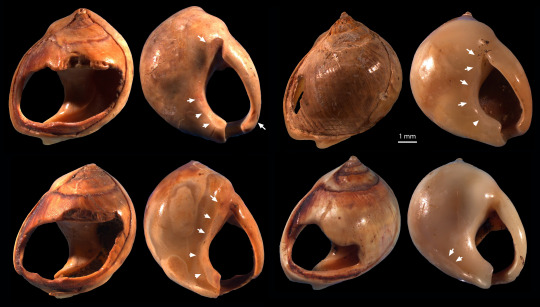
F. d’Errico [modified after d’Errico et al.
Beads of various materials, starting with shells and stones, spread widely with some speculating that trade of beads is what helped with the development of spoken language. It's even possible that beads go back as far as 500,000 years, to Homo erectus, though that is debated. Whether the beads were used in adornment or used as a type of currency or trade medium only is not known for sure, but beads are widely distributed and the materials show evidence of travel (for example, marine shell beads found in landlocked areas). It is thought, though, that wearing of beads came after decoration of the body with ochre.
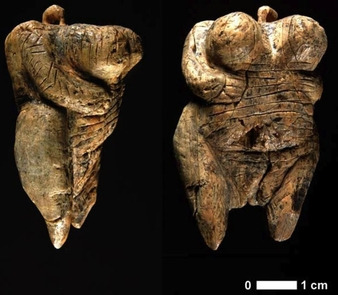
By http://www.nature.com/nature/videoarchive/prehistoricpinup/ image copyright H. Jensen / Universität Tübingen, Fair use, https://en.wikipedia.org/w/index.php?curid=22799118
The earliest depictions of clothing we have is around 41000 years ago, with the Venus of Hohle Fels, which was found in Sweden, though it is possible that the decorations on the body of the Venus figurine is ochre or tattoos. Interestingly, the oldest known musical instrument, a bone flute, was found near the Venus figure, indicating that fully behaviorally modern humans lived in the area.
Based on studies of head and body lice, humans began wearing clothing about 107,000 years ago. Part of the need for clothing was that this time was that this was during the start of the Last Glacial Maximum, when temperatures started dropping and glaciers began overtaking the northern latitudes. Humans, both Neanderthal and Homo Sapiens, had spread quite far by this time. Humans developed in the steppes of Africa and weren't well adapted to the cold, with no real body hair to hold in body heat.
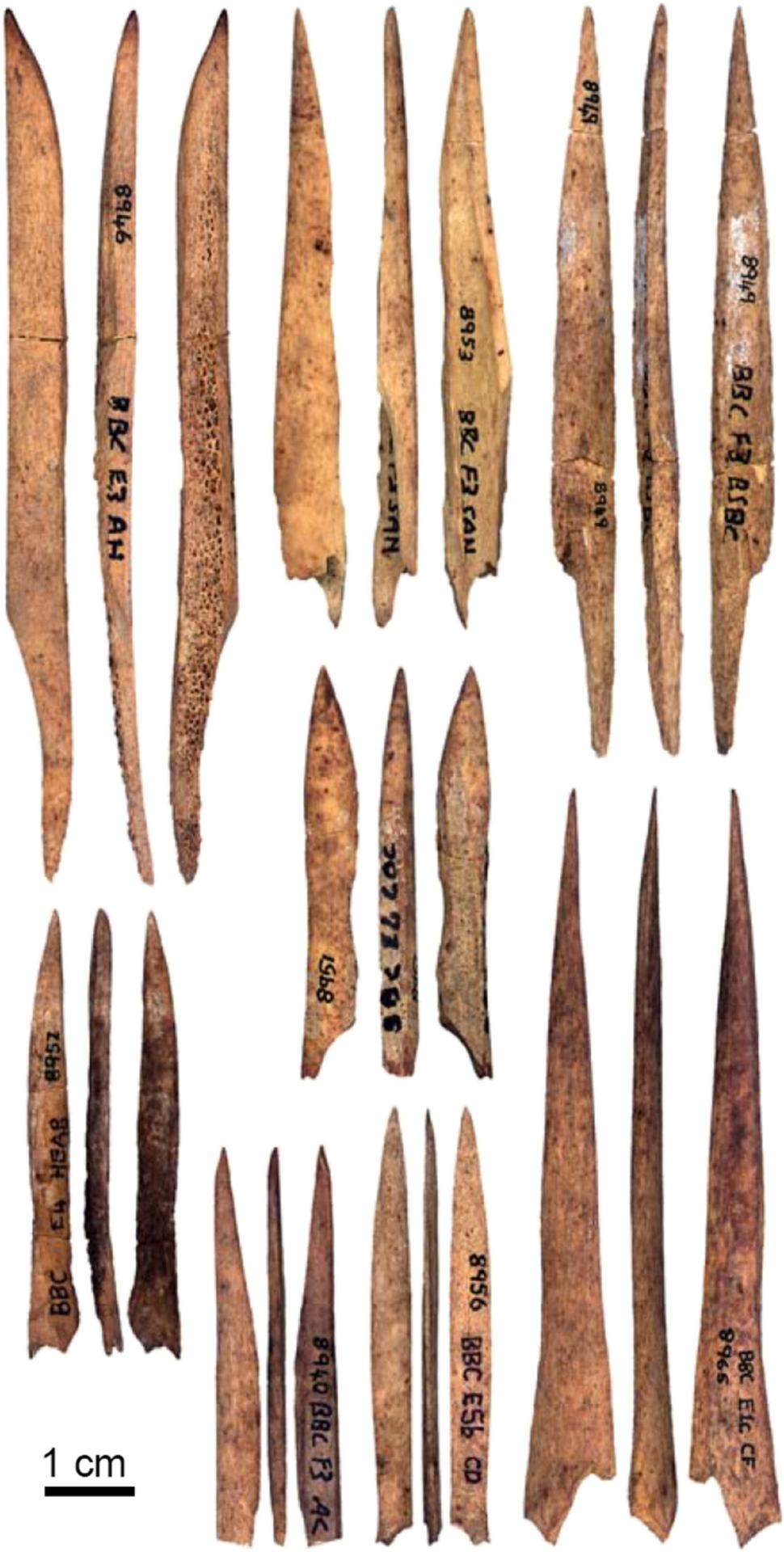

F. d’Errico.
Due to the organic nature of clothing, it's difficult to say for sure when exactly clothing began to be worn and what it was, but we are relatively certain that the first clothing was likely hides of animals. We have found stone and bone tools used to scrape hides from the Early and Middle Pleistocene. These tools also hold evidence that Ochre was used to color the hides. Awls, which were used in southern Africa approximately 73,000, years ago show that hides were pierced beginning very early. These awls show wear patterns of being used on soft, well-worked hides, though whether for clothing or bags, we can't know for sure. These awls spread to Europe by 45,000 years ago, though likely manufactured by Neanderthals based on the theorized distribution of various hominoid groups and remains in the locations they were found.
The benefit of using an awl to create holes in leather is that it can be shaped to the human body, making it more efficient at keeping the body warm, thus reducing the number of layers that need to be warn and allowing humans to spread further during the Last Glacial Maximum.
Approximately 40,000 years ago, in the Denisova Cave, at the time inhabited by modern humans, the first evidence of awls with eyes, or what we now know as needles, appear. This indicates that sewing together clothing, or the decoration of clothing, was becoming more common and more efficient. These needles spread widely, either through trade, contact, or independent development widely, even to the Americas and Australia. It is thought that this led to clothing being decorated more elaborately with beading and other forms of decoration.
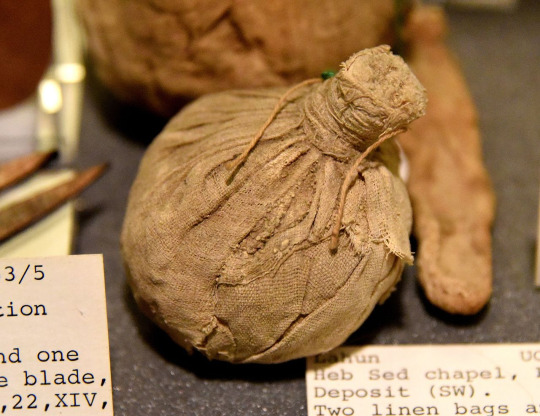
By Osama Shukir Muhammed Amin FRCP(Glasg) - Own work, CC BY-SA 4.0, https://commons.wikimedia.org/w/index.php?curid=56200885
While plant fibres don't generally fossilize, we do have some early evidence of people using them as early as 50,000 BCE, possibly used by Neanderthals, in southern France. There is are scattered imprints of cordage and net imprints in clay. As the planet warmed and the Holocene began, weaving of plant and animal fibres, depending on the local climate and availability. While weaving may have begun as early as 25,000 BCE, flax cultivation began around 8000 BCE, and the first evidence of weaving in 6000 BCE, used as a grave wrapping in Çatalhöyük. Approximately 3000 BCE, sheep were domesticated and bred for wooly fleece as opposed to hair in the Near East. In the Indus Valley, cotton was domesticated around 2500 BCE. Evidence of weaving beginning around 10,100 BCE have been found in the Americas, specifically Guitarreco Cave in Peru, where cotton and llama and alpaca were domesticated. Intricately dyed and woven silk was well developed as a craft as early as 2700 BCE, with the first silk reaching other places in the world nearly a thousand years earlier with the very first evidence of silk being used at all dating back to 8500 BCE.
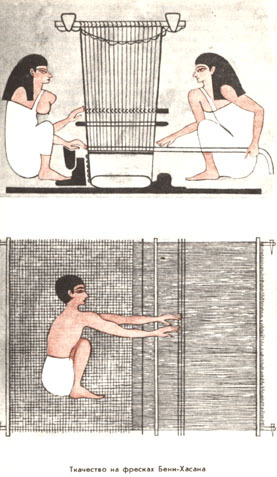
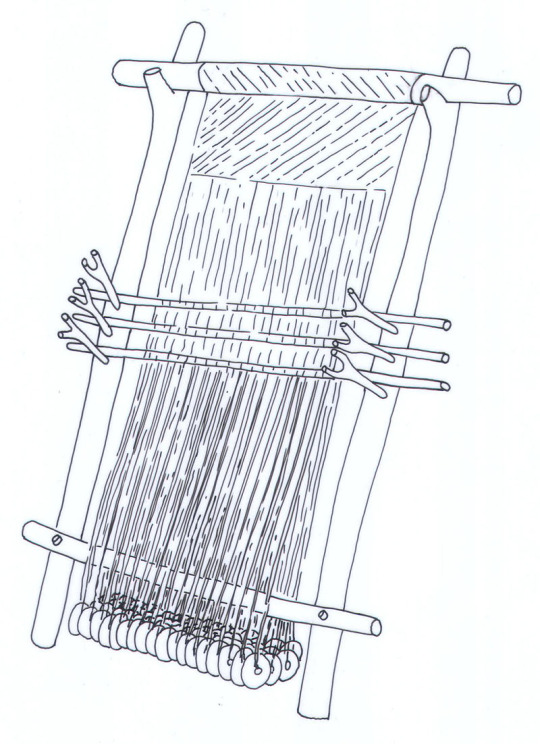

By Unknown author - http://www.booksite.ru/fulltext/nee/lov/tka/che/stvo/1.htm#1, Public Domain, https://commons.wikimedia.org/w/index.php?curid=7483824 By Annika Jeppsson og Danmarks Grundforskningsfonds Center for Tekstilforskning (CTR), Københavns Universitet, Attribution, https://commons.wikimedia.org/w/index.php?curid=33188674 By Zhou Guanhuai - Own work, CC BY-SA 4.0, https://commons.wikimedia.org/w/index.php?curid=142167208
It seems that civilizations may have developed weaving independently, so the first type of loom is difficult to figure out as some locations show that floor looms were first, while others show evidence of hanging looms, and yet others, it seems that what is now known as a 'back-strap loom' was first, while other locations show the use of a floor loom first. Given that these objects were made mostly of organic matter, the evidence comes from art, loom weights (stone or clay weights used to keep the warp threads taut while the loom was in use. Egyptian art shows the use of floor looms, Grecian urns show the use of warp-weighted looms, many native cultures used back-strap looms prior to European contact and colonization. From what fabrics that have been found, each culture developed its own method of creating decorated fabric, either through the application of decorations or through the weaving of the fabric itself, as well as multiple weights of cloth, from fine gauze through thick rugs out of nearly any plant or animal material that could be twisted into yarn.
#body decoration#weaving#sewing#leather work#floor loom#warp weight loom#back-strap loom#fabric#human history#human development
52 notes
·
View notes
Text
The Anniversary of Hypnos and Pasithea
An anonymous user came to us stating that Hypnos desired for them to celebrate His marriage to the beautiful and youngest of graces: Pasithea. With the information given to us, we have decided to implement this Holiday as official under the Temple of Hypnos.

The date this shall be celebrated is July 15th as ordained by the God of Slumber Himself.
Pasithea is a grace/charity Goddess, She has blessed domain over fertility, creativity, nature, and beauty. Hypnos, God who lay beside Her, domains over Sleep, dreams, subconscious, creativity, and even flowers.
As it is a marriage-related holiday, devotees can invite the two deities into their home for a celebratory meal. This can be done using invocation(candles, prayer) and opening windows to invite nature into the home. The area may be decorated using flowers, sticks, creative projects dedicated to the two gods, or more. The prepared meal offerings can include poppy meal, lavender meal, red wine, or other food associations. The graces are also associated with flutes or other wind instruments, so music can be played.
As a devotee other things you may do for this holiday are creative pieces such as poetry, painting, sketching, fabric arts. Dream interpretation is also considered creative works!

Honor to Pasithea! Honor to Hypnos! Blessed be their marriage!
#hypnos worship#hypnos deity#hellenic polytheism#hellenic pagan#pagan#hellenic deities#deity worship#hypnos devotee#helpol#hellenism#hellenic#hypnos holiday#hellenic holiday
83 notes
·
View notes
Note
Hi! Can I request diavolo reacting to reader who had become his wife/queen being hit on by another king who us visiting the devil domain? Saying things like "you are a lucky man", being overly touchy with reader, even going as far as asking if diavolo was willing to " share"?
note: I’m SO sorry this took so long to come out 😭 I just graduated so hopefully I should have more time to focus on being mentally ill 😝💪 the ending doesn’t rwallt fit the mood of the rest of the writing but i like jt too much tk get rid of it
somewhat proofread 😭
Content warning: uhhh catcalling???, inappropriate comments, objectification, jealous Dia
Fem!MC
—
It had been a slow day for Diavolo, and knowing he had to attend a formal party after work helped a little to ease his nerves. The thing he’d be looking forward to all day is seeing you, who’d be accompanying him as his plus one. (as if you weren’t going to be invited anyways.)
He appreciated all the effort his citizens put into celebrating him, however he was simply too exhausted after how slow the day had been dragging on. It was his birthday and he was still forced to attend business meetings and keep up with his paperwork to avoid falling behind. (Barbatos’ orders. He’s scary when he’s angry, and Diavolo did NOT want to feel his wrath.)
A simple knock on his door alerted him of Barbatos’ presence, speak of the devil, before the butler let himself in. Upon entering the room and seeing Diavolo hunched over his desk, slowly dwindling away at the stack of documents he clicked his tongue.
"Young lord," he started, drawing Diavolo's attention away from the paper, "it's time to get prepared, we must leave in the next hour."
With a relieved sigh, Diavolo stood his stretched his aching limbs, glad to be going to the party seeing it as a distraction from the endless paperwork he had to sign.
——
Being with you at the party definitely brightened his mood as the two of you chatted and laughed together, occasionally interrupted by a demon cheering birthday wishes.
“Oh, Dia, I’ll go get us some drinks.” Diavolo smiled as the nickname naturally slipped past your lips, “what do you want?”
“Whatever you’re getting, my dear.” seeing the unamused glare you sent him made him chuckle.
“You better not complain,” you reprimanded jokingly, patting his arm before heading to the beverage table.
He allowed his eyes to follow your figure before he heard a whistle next to him. He turned his head in the direction of the noise to see someone eyeballing you. Diavolo quickly noted the other demon was the crowned prince from another kingdom, visiting in place of his father to celebrate Diavolo. He also noted that he was very, very drunk. A risqué compliment slurred past his lips followed by a hiccup before he noticed Diavolo.
“Oh! Lord Diavolo,” He laughed too loud for comfort, “congratulations!”
“Thank you.” Diavolo replied with fake gratitude, curtly nodding.
“Yesss, you caught a real beauty alright.”
“Excuse me?” Diavolo scoffed, ‘caught?’
The other prince tipped forward, gasping when his drink nearly spilled over before, sloppily, regaining “balance” and downing another flute of demonus. He called over a waiter who, begrudgingly, handed him another.
“You know-“ a hiccup interrupted his speech, “-you should sharee, she’s a pretty one and I’d like a bite if her myself.”
“Excuse me?” Diavolo repeated, feeling his blood begin to boil.
The demon bellowed, waving the new glass of Demonus in the air, “you heard me, yes you did!” He hiccuped, “you’re a lucky man, alright!”
Diavolo glanced over towards you, and felt a wave of relief upon seeing you were still at the beverage table, now chatting with Lucifer. He was silently thanking his friend for occupying you at the moment; he could only imagine how uncomfortable it would have been for you to listen to some drunkard babbling about your body so inappropriately.
You caught his gaze and sent him a pleasant smile, waving. The angry expression he wore faded momentarily as he returned the smile and waved back, before turning his attention back to the drunken demon standing before him, who’d tipped his head back and downed another flute of white wine.
You quickly finished your conversation with Lucifer and dismissed yourself, eager to get back to your boyfriend.
“Hey Dia,” you greeted, interlocking your fingers with his and rubbing your thumb along his, “sorry I took so long.”
Diavolo flinched at your touch and inwardly cursed, sending the demon another nasty look before trying to drag you away from the offender. “That’s quite alright my dear, you could have stayed longer.”
A whistle startled you and caused Diavolo to let out an irate sigh. You turned your attention to the source of the noise, a brow quirked. “Excuse me?”
“Mc, no,“ Diavolo’s plea fell to deaf ears as the demon started talking.
A hiccup followed by a string of coughing as the demon slurred out a provocative comment, waving around the, now empty, flute merrily and swaying closer to the couple.
Diavolo instinctively stepped in front of you, holding you behind him so the demon wouldn't try grabbing you. "End this behavior at once or I'll have to ask you to leave."
"Ohhh-" the demon gagged and swallowed, "don't be that way, I'm just sayin' we could share her, y'know?"
Before Diavolo could react, the demon reached forward to touch you, barely grazing your arm before Diavolo harshly elbowed his arm away. Barbatos interfered before anything got too out of hand and grabbed the drunkard's arm, twisted it behind his back, and escorted him away from the scene, telling him that they’d be sending him back to his kingdom and informing his father of his behaviour.
Diavolo would have to remember to thank Barbatos later.
He turned to you, both hands on either shoulder, his previous anger dissipated and was replaced with concern. “Are you alright, my dear? I deeply apologize for the way he was treating you.”
“I’m fine,” you cup his cheeks, watching the way he melted in your hands, rubbing into your hold, “are you okay, Dia?”
He angled his head to place a tentative kiss to the palm of your hand, a pleasant smile returning to his face, “I am now, my dear. Thank you.”
You gently pinch his cheek, earning a giggle from him before you also began giggling, “what for?”
“For choosing me.”
“Oh, Dia you big sap,” you pinched his cheeks again before pressing a kiss against his lips, feeling him smile against yours. You would have kissed him so more it you two weren’t in public, surrounded by the presence of many nobles, who’d frown upon the un-princely show of affection, “I love you so much.”
“I love you too, my dear,” he cupped his hands around yours, before pulling them away from his face and straightening his posture, “now that we won’t be interrupted again, where are the drinks you were wanting me to try?”
“Oh,” you cupped your free hand over your mouth, “I forgot them by Lucifer, I saw you and got distracted.”
Diavolo laughed, squeezing your hand, “well lets go over, together this time, shall we?”
482 notes
·
View notes
Text
LOZ TOTK Isekai - Changing Fate, Creating Destiny
(Part 1 2) (This is Part 2)

The quiet afternoon in the castle gardens had been filled with light laughter, the soft rustling of leaves, and the occasional chirping of distant birds. Zelda sat beside Adria, both women leaning in close over a small object that had become a source of shared fascination—Adria’s phone. It was a curious thing, so much like Zelda’s Purah Pad and yet, in many ways, completely different.
Zelda had initially been awestruck by the phone's capabilities. While her Purah Pad had a map, a detailed record of their surroundings, and could help locate materials, the phone seemed to offer a glimpse into another world entirely. It couldn't predict weather or pinpoint resources, but it could store something far more personal—memories and emotions.
They had spent hours comparing their devices, laughing over stories as they swiped through images and videos. Zelda had shown Adria pictures of the places she had traveled in her time, the cliffs of Zora’s Domain, the sweeping expanse of the Great Plateau, and the sight of the massive Divine Beasts that once roamed Hyrule’s lands. Adria, in turn, had shown her pictures of her family, friends, and strange landscapes Zelda had never imagined—tall buildings, bustling cities, people dressed in strange garments.
The most astonishing aspect of Adria’s phone, however, was its ability to play music. Zelda had known instruments, of course—the lyre, the flute, the soft hum of a Sheikah harp—but the phone was different. It played music from a distant place, without needing an instrument at all. The first time Adria had played a song from her device, Zelda had fallen off her chair in shock, her heart racing at the sudden, unfamiliar sound.
Adria had rushed to her side, her face filled with worry. But once Zelda had managed to calm herself, they had both laughed, the surprise giving way to amusement. “I’ve never seen anyone react like that to music before,” Adria had giggled, her eyes sparkling with warmth.
Zelda smiled at the memory. She still couldn’t get over how strange and wonderful the music was. Today, they were sitting in the garden, and Adria had once again let the music play softly through her phone. The tune was haunting, the voice deep and rich, filling the air with a melancholy beauty.
Adria sang along, her voice low and steady, perfectly matching the pace and tone of the song:
"When I was a child, I heard voices...
Some would sing and some would scream.
You'll soon find you have few choices...
I learned the voices died with me."
Zelda sat transfixed, her gaze resting on Adria as she sang. There was something magical about the way Adria’s voice blended with the music, as if she were not merely singing but sharing a piece of herself with the world. The words were heavy with emotion, and Zelda found herself enchanted by the melody and the meaning behind it.
“What a beautiful song,” Zelda whispered when Adria paused. “It feels… so personal. Where did you learn it?”
Adria smiled softly, tucking her phone back into the folds of her dress. “It’s from a singer back home. I used to listen to it a lot when I needed to think or… when I felt lost.” She looked up at Zelda, her expression thoughtful. “Music has a way of reaching places that words can’t. It helps me remember things.”
Zelda nodded, understanding that feeling all too well. She felt a strange sense of kinship with Adria in that moment, as if they both carried memories too heavy for words. “It reminds me of my time with the Champions,” Zelda said, her voice barely more than a whisper. “There were moments when all I had were my thoughts and the memories of their voices.”
The two women fell silent, the weight of shared memories hanging between them like a fragile thread. The afternoon light cast soft shadows across the garden, and for a brief moment, all was peaceful.
But then, a subtle shift in the air made Zelda’s senses tingle. She glanced up and caught sight of two figures in the distance—Kotake and Koume, the Gerudo guardswomen who had accompanied Ganondorf. They were watching again.
Zelda’s eyes narrowed slightly, her body instinctively tensing. She had no issue with the Gerudo as a people—quite the opposite, in fact. Urbosa, the former Gerudo Chief, had been like a second mother to her, a source of strength and wisdom. But Kotake and Koume… they were different. They exuded the same unsettling aura as Ganondorf himself. Something about their presence felt off, as if they were more than just warriors, as if they were always observing, always calculating.
Adria noticed Zelda’s sudden change in demeanor and followed her gaze. The smile she had been wearing faltered, replaced by a look of curiosity. “They’ve been watching us a lot lately,” she murmured, keeping her voice low. “I don’t think they mean any harm. Maybe they are shy?”
Zelda nodded, her expression tight. “They’re loyal to Ganondorf, and Ganondorf is… ambitious. They’re likely keeping an eye on us for him.”
Adria let out a small, nervous chuckle. “Great. And I'm not even in my nice outfit.”
Zelda placed a reassuring hand on Adria’s arm. “Just be careful around them. Kotake and Koume aren’t like Urbosa. They may seem friendly, but they have their own agenda.”
Adria sighed, leaning back against the stone bench they were sitting on. “I’ll keep that in mind. I just hope they don’t think I’m some sort of threat. I’m barely managing to keep myself together most days.”
Zelda smiled softly, though her eyes remained sharp. “You’re stronger than you give yourself credit for. Just… trust your instincts. If something feels wrong, it probably is.”
Adria nodded, her fingers tracing absent patterns on the bench’s surface. “You’re right. And I’ll try not to let their stares get to me.”
The two women shared a brief, knowing look before turning their attention back to the serene garden. Adria began singing a sing-song version of the phrase "I always feel like somebody's watchin' me~", making Zelda giggle.
The tension between them eased, but the presence of the Gerudo guardswomen lingered at the edge of their awareness, a reminder that even in moments of peace, the game was always being played.
#mallowresponse#mallowfic#legend of zelda#ganondorf#Queen Sonia#King Rauru#Princess Zelda#tears of the kingdom#Gerudo#TOTK Ganondorf#Ancient Hyrule#Isekai
36 notes
·
View notes
Note
picnic day with the timekeeper fam?
I had this in the back of my head after I read it because the fam sharing a meal is one of the things we see in a lot of official art. The Suitcase fam actually likes to eat together, even if not everyone is available. I think that shows a bond. Chit-chatting, sharing plates, just wholesome fun.
idk how other people think but i see a scene in my head which is why my HCs usually get typed liked that. It started like this:
Vertin and Regulus share a pack of Pop-Tarts in one of the Suitcases huge bay windows. They're exhausted since they returned from a mission. The weather's really nice and Regulus casually mentions that'd it'd be good day for a picnic. Vertin replies "Then let's have one." No plan, all decided on a whim. Sonetto is actually the one who organizes everything and Vertin delegates responsibilities.
The picnic itself is very soft instead of chaotic because a lot of the members are tuckered out from the mission. Click's been taking pictures of them and enjoys the peaceful day since the Suitcase is usually very lively. Regulus is sharing her music with Sotheby while they cloud-gaze. Druvis is leading Lilya around her garden. She smiles more these days. Jessica is making a flower wreath for Blonney. Zima's writing poetry while listening to Getian play his flute.
Eternity is playing lawn bowling with Centurion and mentions how weird it was for the youths to be napping while the adults play. They are tied, which Centurion isn't used to as a winner, but it makes things exciting.
Tennant is talking to Dikke and mentions that it'd be nice if Vertin created an isolated, private section of the wilderness. Dikke tells her to shut up and also to leave the Timekeeper alone. They end up bickering but neither walks away from the other.
Vertin isn't running around keeping tabs on people like usual. She's sprawled out on a picnic blanket after eating a few sandwiches. The kids run off with her hat and coat but, she lets them. She ends up taking a short nap. When she opens her eyes again, Eagle, Erick, Mondlicht and the other youngsters placed her jacket over her like a blanket and they're curled around her like rabbits.
Vertin gets up carefully without waking them up. She eventually joins a very content Sonetto under a shady tree and the two talk about things that aren't work like Sonetto's recent poems and paintings. Vertin brings up her next idea for the Wilderness but she's very vague. It's because Vertin's next plan for the wilderness is actually inspired by one of Sonetto's paintings but its a surprise.
Tennant's wish might get granted after all.
Everything is very fluffy on this peaceful picnic.
On that note, can you imagine someone actually moving mountains for you? Vertin is like a deity and her Suitcase is her domain. She moves things around at will and its crazy.
42 notes
·
View notes
Text


Chucks pokemon-ified Emmet at you at Mach speeds
Never talked about this au at any considerable lengths but it’s an au @gender-nuteral-nut-boy and I made where Volo promised Emmet that he’d help him find Ingo but just used him in order to get the Azure Flute and open up the stairs to Arceus’ domain. Once the stairs appeared, Volo had Giratina drop him into the distortion world after taking his pokemon. With Emmet taken care of and the stairs to Arceus’s domain open, he also abandons Giratina, breaking the ball he had him in to leave him stranded in the distortion realm as well.
So Emmet and Giratina are chilling in the distortion realm. Emmet is pretty pissed at the betrayal and Giratina is not helping matters. Giratina is trying to relate to and sympathize with Emmet but ends up stoking the fires of his anger, riling him up further and further as he deteriorates in the distortion world. When Emmet passes, his soul is so full of rage he forms into a new pokemon, his memories left fractured and hazy.
Giratina manages to find a way to let Emmet out to Hisui in order to find Ingo and retrieve his pokemon from Volo. Though, maybe leaving an enraged, volatile pokemon alone in the hisuian wilderness with no supervision might not be the best idea.
Some notes about the design: I wanted it to be kinda banshee based with a bit of reaper/psychopomp too. He’s got permanent tear marks and a red stripe supposed to look both like his nose and like an exclamation mark. Little scythe fingers :) he keeps his eyes closed unless he becomes angered, where they open and his hair starts to flare out. He turns into his rage form if his team or trainer become injured at all. His typing becomes Ghost/Ice instead of Ghost/Steel, his scythes turning into ice claws and his hair looking like ice spikes. His chest is supposed to look like a rib cage and his eyes completely black out for “going into a blind rage”
Ok I’m done rambling -u-
Also I made shiny variations!


Enjoy =w=
158 notes
·
View notes
Note
I've got a theory question for tdb (bear with me, I've blazed through story so remembering the beginning is a little difficult)
So at the beginning, the anomaly we met was actively texting us right? Said something about how they've "been waiting to see us" or somethin like that
Which we know anomalies can be sentient (especially if we run with the theory with towa). And I dunno, I wanna loop in the time loop theory somewhere here. If we go with the idea of mc being the girl in the tower and her jumping before a loop maybe, then what (or who) is the anomaly we met?
I've been going through the tdb tag to see if you've mentioned it yet and no one has asked, so I figured I would bc I like bouncing theories... I need to hop on tdb reddit
SO I lurk in the discord server some people on the reddit put together and it was pointed out there that shortly after that happened the dev's other game had a Rapunzel themed event 💀💀💀 so that's what the line about the girl in the tower was likely referencing since it makes sense someone like Taiga would "not be into that shit (i.e. not his game) at all." THAT BEING SAID I am so glad you brought up the anomaly in the beginning because there's some stuff about it I find interesting.
I went and took some screenshots from the summoning and the person who commented under that little theory was right in that the person who is falling does land in the woods, so it could be that whoever jumps off of the tower at the end of the loop does end up in the woods somewhere. It might mean nothing, but I'll hold onto this thought just in case.
Dorms rarely cooperate on missions, so Taiga and Haku being on one together is odd. Taiga also does not seem to have lines referencing Haku, but he seems to have given up on trying to escape the timeloop and wants "the others" to join him in his nihilism. I think this sort of goes with his being a gambler who says there is "no trick to winning you just have keep playing" but still desperately looking to the MC for "something I could do different" or a reason. He wants to have hope again but he isn't able to.
I personally think these "others" he talks about are probably Tohma and Romeo, Tohma because he seems to be one of the more active ones working to isolate the traitor and Romeo because that's his best friend. Oh and while I am on the subject of the traitor, someone brought up to me a crack theory about Luca being the traitor and I have seen some votes for Towa too. While I obviously think that it is almost certain to be Haku, I think there is a potential for a faction split between people who agree with whatever Haku's take on the ghoul's situation is and people who agree with Tohma. Luca is a very good candidate for someone who I could see being manipulated into siding with the "evil" side if he thought it meant it was the only way to protect his brother. Towa will go wherever Haru does, and I can't really see Haru siding with Haku if it involves hurting the anomalous creatures in any way. That and Haku seems very convinced that he's in whatever he's in alone.
But to finally answer your question/talk about what's been bugging me: the anomaly who curses the MC takes her into something that reminds me of a cursed domain from JJK and turns the scenery all red. And like you said they text her! Like it's been stalking her for a long time. I hope we get to learn about how Haku's flute works in the Hotarubi chapter because I want to know how and why he was able to take MC out of the anomaly's domain and return her to the train car. That almost made me think he could control it in some way... I'll have to level his affection enough to see what his pfp is in his texts because it it is remotely similar to the one the anomaly uses I will have a stroke.
As for what the anomaly is... it's profile picture is a spider lily and it uses the name "Mina" when talking to MC. It's head has roses, spider lilies and what I think are supposed to be poppies growing on its head. Apparently there is a Chinese legend about spider lilies and I keep seeing the same text copy and pasted everywhere about it, but I feel comfortable sharing what I found since I was able to find it on Wuhan University's English website: (x)
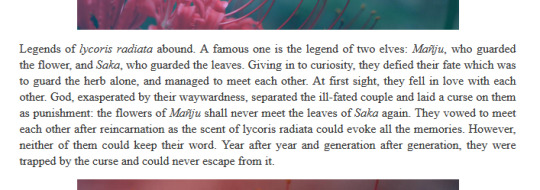
I imagine when we meet whatever monster cursed MC it will be a bit different than whatever is going on here, but MC is talking about how "if she knew it would end like this she never would have fallen for them in the first place." Sure she's just talking about how her favorite band just broke up, but maybe that feeling drew the spirit towards her since it is attracted to/preys on lost loves.
If I am allowed to cope a whole bunch here, I think it would make for solid timeloop building if MC's feelings weren't about the band at all, but about her lost love who jumped off the building at the start of the game. Since the loop has restarted she doesn't remember him, so she thinks her feelings are and directs them towards the band she used to love, but the strength of her disappointment comes from somewhere else.
Thank you very much for your question, it made me think a whole lot!
47 notes
·
View notes
Text
Inspirations for the Sages in A Link Between Worlds
The Sages in A Link Between Worlds are a diverse bunch of characters, unlike the Sages and Maidens from its prequel A Link to the Past, who are all depicted as the same robed men or color-swapped girls respectively. They seem to take more after the Sages from Ocarina of Time, who are from a variety of races and are more distinctive overall. While some of the Sages in A Link Between Worlds take after those from Ocarina of Time, most of them are firmly rooted in A Link to the Past.
Gulley

Gulley is often said to be inspired by the Kokiri from Ocarina of Time, but I don't think that is necessarily correct. Instead, he takes far more after Flute Boy from A Link to the Past in his design. Flute Boy is also found in the Haunted Grove in A Link to the Past, a place that Gulley also frequents. It is possible that the Kokiri as a whole were inspired by Flute Boy as well, given their similar designs, but Gulley's design remains closer to Flute Boy's than to the Kokiri.
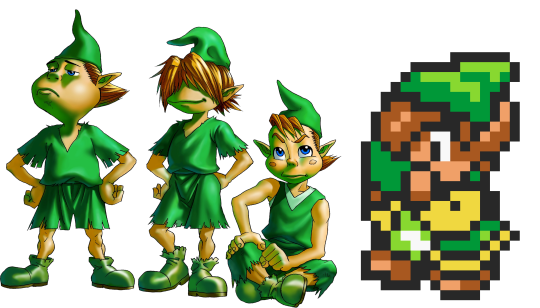
Oren
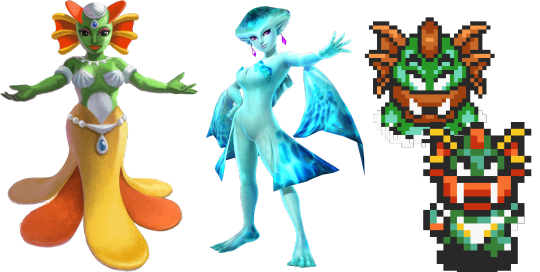
The enemy Zora queen Oren does seem to take after Ruto from Ocarina of Time, as she has a far more humanoid design than the other enemy Zoras that appear in many of the 2D Zelda games. But she does also remain steeped in A Link to the Past, as her Zora's Domain is where Zora's Waterfall was in that game. Oren's design falls more in the middle between the Zora designs common in the 3D games and the enemy Zoras seen in the 2D games.
Rosso
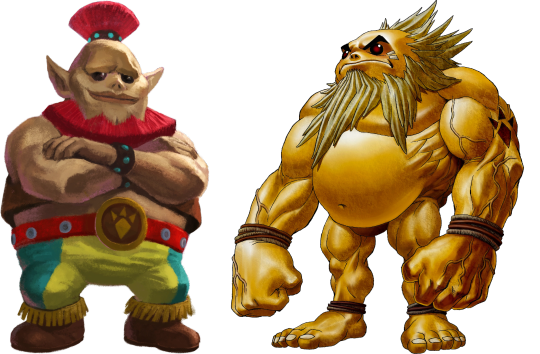
Rosso is a bit of a contentious topic, though he does have obvious ties to the Gorons. He has a belt buckle bearing their symbol and also looks the part with his physique, though he has a few non-Goron traits as well such as ears and fiery red hair. In-universe, he is just a human as Gorons were revealed to sprout from the ground in Tears of the Kingdom, which would make Rosso having Goron ancestry difficult. That said, he still is a clear reference to the Gorons given he is a miner on Death Mountain and he doesn't seem to take after any character from A Link to the Past.
Osfala
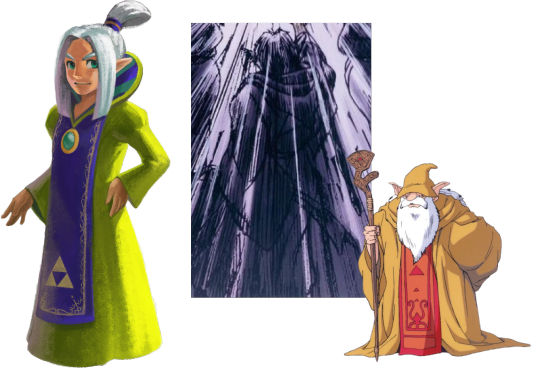
Osfala doesn't take from any character in particular, instead seemingly being inspired by how sagely characters were depicted in A Link to the Past in general. This includes the robed sages of the Imprisoning War and their descendant Sahasrahla. Unsurprisingly, Osfala is also the apprentice of A Link Between Worlds's incarnation of Sahasrahla.
Irene
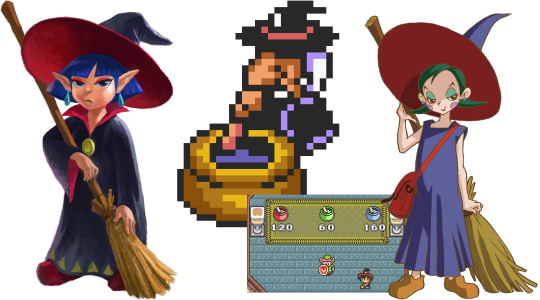
Irene takes after the witches Syrup and Maple from A Link to the Past (specifically its GBA release where Maple is concerned), which is also evidenced by Irene living in the same hut as them. She lives alongside her grandmother, who may actually be an elderly Maple, given her Lorule counterpart is called "Mapes".

Impa

Impa has been a staple of the series since its inception, appearing since the first Zelda game. Impa in A Link Between Worlds is an elderly lady, which is how she appears in the original NES titles, Skyward Sword, Breath of the Wild and Tears of the Kingdom. Impa in A Link Between Worlds is part of this line of old Impas and doesn't pull from any one incarnation in particular.
Seres
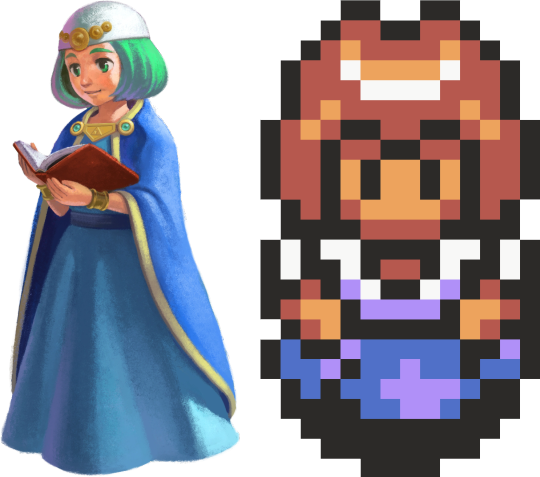
Finally, Seres is a reference to the Maidens from A Link to the Past, who served the same role as the Sages in A Link Between World do gameplay-wise. She is a maiden as well who takes after them when it comes to appearance. Her father meanwhile is the Priest of the Sanctuary. While a similar character did exist in A Link to the Past, he did not have any confirmed family that can serve as a more concrete analogue to Seres.
33 notes
·
View notes
Note
Can you tell some facts about cross??
He was a pure mama’s boy and was visibly distraught and heartbroken upon losing her so early in his young faerling life. A part of him blames his father for his mother’s death as it was his duty to protect her whilst she was still nesting Cross.
It is only in recent times that he’s begun to speak more, as back when he was alone, he would usually keep silent. Because of this, he may often experience a sore throat, though it’s continuously lessening day after day.
He has a deep and profound love for flute and harp music.
He’s as good as any winter fairy when it comes to forging armour and weapons, but his true talent lies in creating detailed accessories, such as tiaras, necklaces, rings, and other body-related decorations.
The progression stages between summer to autumn, and autumn to winter is when he feels the most comfortable temperature-wise. It is only in those small windows, however. Fully matured autumn leaves him feeling strangely… humid and cold.
Accidentally befriended an elder human woman after making her turn back from approaching Error’s domain. She would leave him little gifts, often homemade food, and clothes as thanks for saving her. He went to stay with her on the last days of her life; making sure she was comfortable in her lonesome cottage. He keeps the clothes she gave him securely hidden in a private chest within his personal nesting shelf in Error’s Mountain halls.
As much as he loves that Dream is extremely willing to touch and cling to him whenever he likes, it is the hand-holding that Cross appreciates the most. He likes the sensation of someone holding onto his hand. It makes him feel very warm inside.
He’s a fierce fighter. Anyone who poses a threat to any type of fairy will be met with his ire, and he will show them no mercy. He’s not afraid to use his magic and scale himself up, and due to the fact that being a hybrid has given him some strange advantages, he’s got the ability to become quite tall once he appears in the image of the Big Folk. All who are at the end of his anger will often flee in fear.
His voice is pleasant and deep.
He once sat completely still in a field because a couple of butterflies had landed on him, and he didn’t want to frighten them away.
64 notes
·
View notes
Text
The myth of Dionysos (3)
For the previous posts, see here and here.

V) The cult of Dionysos : Outside the city, inside the city
Such a god apparently does not have his place in the Ancient Greek city. Séchan-Lévêque reminds us that his religion, at the same time joyful and wild, is centered around the “thiasus”, that is to say a gathering of male and female beings joining outside of any civic or familial setting. According to Euripides’ description and to the various visual depictions of Ancient Greece, all the cultural elements surrounding Dionysos are the very opposite of the rational organization of a State. His cult takes place on the countryside, in woods and mountains. It takes place at night. The participants wear an animal skins over their clothes (or replacing their chiton), their hair is wild or crowned by ivy or laurel, their belt is made of a snake or a baby leopard hangs from it ; in one hand they hold the thyrsus and in the other a small animal (hare or young fawn). The music played for Dionysos is strange: flutes, tympanum and castanets. His ceremonies are chaotic: wild dances, convulsions, exhausting races. His sacrifice is performed by ripping apart animals before eating their raw flesh. The thiasus could be made of men, but the most famous of all the thiasus is the female one, and its members are called the Menads, the Bacchants, the Thyads, the Bassarides… Ordinarily, women of Ancient Greece were locked up inside the gynaeceum, so to have them becoming wild and savage makes the cult of Dionysos a unique one, set apart by the official religious events of the city, since he breaks all urban religious rules. Similarly, the mysteries of Dionysos unite together men and women, citizens and slaves, which meant breaking apart the Ancient Greek social hierarchy.
And yet, this Dionysos that destroys the order of the city is greatly honored at Delphi, the domain of the Greekest of all gods, Apollo. The Pythia reminds the audience, in Aeschylus’ Eumenids, that she honors the nymphs over which rules Bromios and his Bacchants, with explicit references to the story of Pentheus. Every year, during the three months of winter, while Apollo leaves for Hyperborea, Dionysos replaces him. And every two years, the Thyads of Delphi and the Bacchants of Athens, holding torches, celebrate on mount Parnassus the son of Semele. In the adyton of Apollo’s temple, legends claimed Dionysos’ tomb could be found. The poets frequently exchanged the names and nicknames of the two deities: Aeschylus wrote in Bassarids of “Apollo with ivy, a bacchant and a seer”, while Euripides in Likymnion wrote of “Lord Bakchos, friend of the laurel, Pean-Apollon with the beautiful lyre”. As such, despite Nietzsche’s strict opposition between the god of harmonious restraint and the deity of savage drunkenness, the two gods are actually far from being polar opposites.
Dionysos also finds a home at Athens. We already saw several of the festivals in his honor there: Apaturia, Anthesteria, Oschophoria… But to those can be added the agrarian Dionysia, the the Lenaia, and especially the great Dionysia: during those, contests of dithyrambic, of tragedies and of comedies were held, gathering an audience coming from all four corners of Greece. Traditionally, the tragedy, the “tragodia”, is read as meaning “the song of the goat”, tragou-ôdè, since the goat was the animal traditionally sacrificed to the god. During the first day of the Great Dionysia, the statue of Dionysos was carried inside the “orchestra”, at the very heart of the city. And during the contests, a place of honor was kept for the priest of Dionysos. The marginal god clearly earned his place among men and Olympians.
Because, according to the Bacchants, inside the Dionysian chaos, there si a superior order, an “eukosmia” that unfortunately Pentheus fails to see, since he is a young tyrant filled with hubris. However the wise rulers of Athens did perceive and honor this superior order – unlike the Roman Senators that, in 186 BCE, harshly repressed any participations to the Bacchanals.
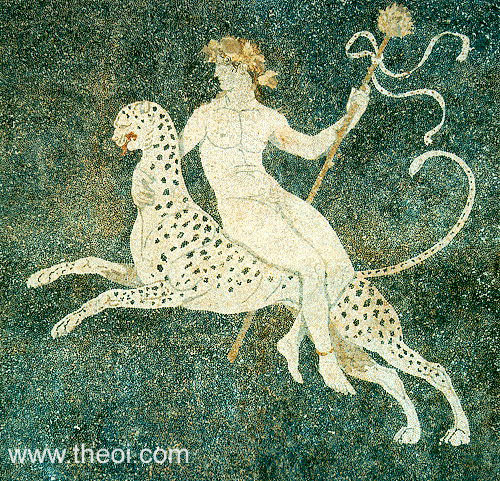
VI) Dionysos in service of political and religious doctrines: various uses
Multiple, complex, contradictory and shapeshifting: the god offered to the political and religious domains a very malleable material. For example, there are obvious links and mutual influences between the eastward journey of Dionysos and the eastward journey of Alexander. Alexander, just like his soldiers, and just like his historians, know of the story of the god’s travel to the East – the Dionysos of Euripides, in the Bacchants, said himself: “I left Lydia with his gold-fertile fields, I left the plains of Phrygia for the sun-burned plateaus of Persia, the walled cities of Bactrian, and the land of the Medes, frozen by winter ; and happy Arabia ; and finally all of Asia, laying by the salted waters…” Alexander took his army on the very steps of Dionysos. Of course, the Great was going to make the god the patron of his expedition, and as such Alexander was celebrated as the “new Dionysos” (a title that future rulers of Alexandria will also bear). The parallel grows stronger with the encounter by Alexander’s army of a town named Nysa, located near the mount Meros (a word that sounds similar to the Greek word for “thigh”) – the prince claimed the people of Nysa were descendants of the Greek people that Dionysos took with his on his own journey. However, in a complete circle, the adventure of Alexander the Great influenced greatly Dionysos’ own travels. India, for example, was never named in the tale of the Bacchants. But after the exploits of Alexander, Dionysos became the conqueror of India. Poets, painters and sculptors all depicted him taking part in this “war of India” that Euripides had never heard about. In the 5th century CE, this tale grew to enormous proportions thanks to Nonnus’ Dionysiaca, an epic in 48 chants, and where the Indian travel is described from chant 13 to 40.
Despite the recent doubts of some scholars, there is a possibility that Cesar and Augustus used for their political agenda the glory of this god celebrated everywhere in the oriental part of the Roman empire, and even in Rome itself – by both the Greco-Oriental population and the administrative elite of the Hellenism. Indeed, the assimilation between Dionysos and the Latium god Liber Pater had been done for a long time by now, and that despite some strong oppositions (such as the stern repression of the cult of Dionysos in 186). And the success of this religion was noticed by the political authorities. Servius commented what Virgil wrote in his Bucolics, about how Daphnis, on a “chariot pulled by Armenian tigers”, was the first to introduce the “thiasos of Bacchus”. Servius reminds his reader that in truth, it was Cesar that first brought the “mysteries of Liber Pater” to Rome – and as such behind the triumph of Daphnis, one reads as much the travels of Alexander as the exploits of Cesar… Two men that Augustus claims to be the heir of.
This “politic of Dionysos” knew its climax between the second and third century CE, through Hadrian the philhellenic, who demanded to be called the “new Dionysos”. In the same tradition as Alexander the Great, and as the many Hellenistic rulers, from Gallian (who, while leading a double fight against the Barbarians and the Christians, wanted to return to the Greek tradition) to Elagabalus (who had the habit of driving a chariot pulled by lions and tigers).
Dionysos was also used for philosophical and religious agendas. As such, the Orphics, reused in their beliefs the myth of the god’s murder by the Titans. Marcel Detienne wrote about how the myth of Dionysos was the perfect illustration for the main teaching of Orpheus: refrain from murder. In its double sense of 1) do not kill your fellow human being ; but also as 2) do not eat meat. On top of that, Dionysos’ resurrection echoed the belief in palingenesis of the disciples of Orpheus.
With this context, it makes sense that Christian writers, such as Clement of Alexandria or Firmicus Maternus, focused their attacks onto a myth that, for them, was a caricature of their beliefs and a parody of the sacraments of their own religion. Passion and Resurrection (Gregory of Nazianzus even used three hundred verses of the Bacchants in his Christus Patiem), Eucharist, and even the concept of Original Sin – because Dion Chrysostom wrote that mankind was born from the ashes of the Titans mixed with the earth. As such, humanity was part at the same time of the crime of the Titans, and of the divinity of Dionysos (who had been eaten by the Titans). The Christian attacks were also very strong because Orphism, through this myth, had brought to the cult of Dionysos the theology that it lacked (since in the Mysteries of Dionysos, the ritual had a larger and stronger place than the theory).

VII) A diversity of interpretations
In front of such a complex and elusive personality, it is impossible to give just one interpretation of the character of Dionysos. From the third millennium BCE to the fall of the Roman Empire, the god constantly played a role – his figure was constantly shaped by societies, governments and people. As such, the interpretations offered by mythologists allow us to better understand Dionysos, but they will never be complete or exhaustive. As much, all they can do is bring to light some key elements of his being.
While the mythologists of the early 20th century were prone to excesses, the interpretations of names such as Frazer, Farnell or Miss Harrison are still very interesting. Dionysos is first and foremost a vegetation god, a fecundity god, a chthonian god. Many of his ceremonies are rituals celebrating renewal. He is a god of plants; his emblem if the thyrsus, a branch or a reed stalk crowned by leaves of ivy/vine, or by a pine cone. All these plants play a important role in both the rites and the myth of Dionysos, even though from the 7th century BCE onward he specializes himself as the god of the grapevine and of wine. Dionysos is the lord of the tree. As we saw before, he is related to the Oriental mother-goddesses and to the Aegean world. His wife is Ariadne – who might have been during the Classical era a human, but that was once an Aegean goddess of vegetation. Dionysos is the master of both animal and human fecundity – his favorite companions, the satyrs, the donkeys, the goats, the bulls, are all depicted with a very large phallus. He went down into the Underworld to bring back his mother Semele, and he presides over the Anthesteria, which was a celebration of the dead. Zagreus was believed to have for a mother Persephone, and for a father either Zeus or Hades – and in fact, Zagreus was sometimes identified as being an alternate identity of Hades. This chthonian side of Dionysos was developed in his mysteries: the initiation, the purifications, the teaches of sacred formulas have for a main purpose to allow the dead to escape all the dangers that threaten their travel to the afterlife ; and ultimately, to allow them to find happiness in the Hades.
The Bacchic drunkenness and the possessios/trances of the Menads have also brought forward numerous psychological, psychoanalytical and ethnological commentaries. The dances of the Bacchants were compared to those of the whirling dervishes, of the Jewish Hasidim, of the Siberian shamans and of the American Shakers. This phenomenon was proven to have been widespread throughout all of the Antique Mediterranean world – and to still be existing today in a part of Africa. Séchan-Lévêque noted that the “delirium of the Bacchants” was in many ways similar to neuropathic manifestations. Convulsive and spasmodic movements, the body bending backwards, the neck being thrown around… Both also involve a feeling of depersonalization, the feeling of the self being invaded by an outside persona or entity. Psychanalysts saw a parallel between the mechanisms of the Dionysian possession and various concepts of child-psychanalysis: they claimed that the ritual of the god had a therapeutic effect. The Dionysos-Hades becomes a Dionsyso-Asclepios.
Another theory that should not be ignored is the theory of the “pharmakos”, or the theory of the “scape-goat”, that was popularized by Frazer and then by René Girard in his interpretation of Euripides’ play. The tragedy of the Bacchants presents itself at first like a ritual bacchanal. All differences are erased: all take part in the celebration, be them old or young, male or female, citizens or slaves. But the party goes wrong, violence arrives. The difference becomes an inversion: women perform martial activities, men disguise themselves into women. Human and animal worlds are confused for one another: the Bacchants rip apart of a herd of cow they mistake for men, Pentheus ties up a bull he thought was Dionysos, Agave murders Pentheus while seeing before her a lion. Pentheus, in his transvestite outfit, is a Carnival prince, a temporary king – as Jeanne Roux notes, he is at the same time the scape-goat carrying with him all the soiling and vices of the past year, and the sacrificial victim to open a new and clean year. The symbolism becomes even more obvious due to the fact that Pentheus, in his female disguise, climbs on top of a pine and falls from it. A. G. Bather, in The Problem of the Bacchae (Journal of Hellenic Studies, 1894), noted that in Russia, during Pentecost Thursday, there was a very similar ritual. Villagers had to cut down a young pine-tree and disguise it as a woman before bringing “her” to the village in great joy. Three days later, on Trinity Sunday, the wooden figure was taken out of the village and thrown in a body of water. In Euripides’ play, at the end of the party, the pine-tree is ripped away, the king is killed and torn apart: Pentheus is inflicted a diasparagmos (a dismemberment) by the hands of his own mother and of his aunts. Which in turn will become new scapegoats, as they will be banished from the city afterwar. A new order will rule over Thebes: as René Girard notes in La Violence et le sacré (Violence and the sacred), Dionysos is the god “of the successful lynching”. However we saw previously that Pentheus is the double of Dionysos. Just like his adversary/reflection, the god, in the myth of the Titans, also suffers a diasparagmos. As such there is an identification between the pine-tree that is uprooted, and Dionysos Dendritès, god of the trees. While in Euripides’ play the god appears as the organizer and the force behind the scapegoat ceremony, it is possible that in ancient times he used to be the victim of said ceremony.
Finally, numerous analogies bring Dionysos close to the “kouroi”, the novices that undergo initiation-trials. Pausanias describes how Cadmos placed Semele and young Dionysos in a chest that was thrown in the water and ended in Brasiai/Prasiai (a port of Laconia). This type of trial was also known by other great heroes – Perseus, Moises, Romulus. Just like the initiated ones of the three first classes of Ancient India (the dvija), Dionysos is “twice-born”. Just like Achilles, Herakles and Jason, who were all raised by the horse-man Chiron, Dionysos knew animal-men during his childhood: the goat-men that were the satyrs and the silenes ; but also wolf-men, such as Lycurgus (whose name means “He who acts as a wolf, from lukos “wolf” and “ergon”, action), or Athamas (that Apollodorus compares to a wolf). Just like Achilles that was disguised as a girl, just like Theseus that was mocked for his dress and braided hair, just like Herakles that had put on a dress before queen Omphalus, Dionysos knew the experience of the feminine cross-dressing. Just like Achilles, Melicertes, Herakles, Pelops and Jason, there is the trial of the cauldron – killed, dismembered and boiled, he was resurrected. (Jeanmaire wrote that it is a legend with a strong initiation symbolism, and that seems to answer to very archaic practices explaining or interpreting the dangers that threaten children and teenagers). Just like in African initiation rituals, the rhombus played a key part in his death-resurrection. Just like Pelops, whose homosexual loves for Poseidon have analogies with the initiation of young Cretans, Dionysos, with the mysterious Prosumnos, acts as the hero of an initiation-adventure. Just like Odysseus, Herakles, Orpheus, Theseus, Aeneas or Jason (the latter only through symbolism), he went into the Underworld. Finally, just like Theseus and Gilgamesh, he plunged in the water (and even twice) to escape Lycurgus and to find his mother in the Hades. All those trials are so many shapes of initiation rituals, of obligatory rites of passages allowing the teenager to leave the world of childhood and to join the world of adults.
As such, despite all the critical efforts to understand Dionysos’ personality, to bring an exhaustive interpretation including both his complexity and diversity, the god keeps escaping our minds, breaking our settings, removing the chains with which we would try to bind him. All the way until the end, he will stay elusive. So let us remember how, in both the Homeric hymn to Dionysos, and the Bacchants, Dionysos is always presented as the “un-binder”, as the “Eleuthereus”, the “Luaios”, the “Lusios”, the one that detaches, that sets free ; the god on who all ropes and all binds fall to the ground, the god who can escape any net without effort, the entity that can never be trapped because all those that think they caught him are in fact not even touching him.
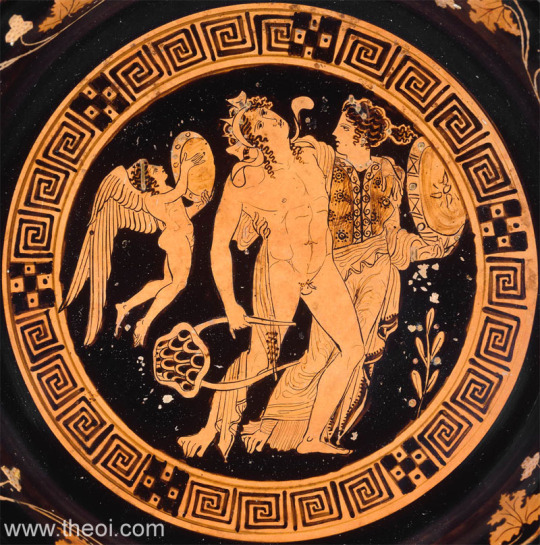
#dionysos#dionysus#greek god#greek gods#mythology#ancient greece#ancient rome#roman religion#greek religion#roman gods#roman mythology#alexander the great#bacchants#pentheus#orphic cult#orphic religion
53 notes
·
View notes